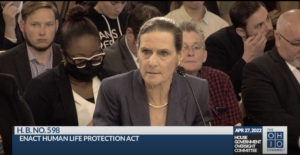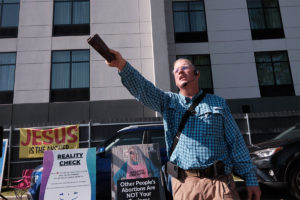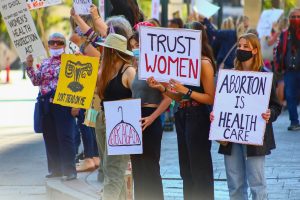
Women’s Mental Health After The Fall of Roe v. Wade
Rykia Bernard writes on the hyper-polarization of women’s-rights issues, specifically in southern states, since the overturning of Roe v. Wade.

Rykia Bernard writes on the hyper-polarization of women’s-rights issues, specifically in southern states, since the overturning of Roe v. Wade.

Hattiesburg, Miss., native Virginia Sciolino writes that when having discussions centering abortion and women’s reproductive rights, emotional intelligence and empathy is needed to break barriers and to challenge systemic disparities. We should “come into conversations with an emphasis on empathy, boundaries, mutual care and respect,” she writes.

Dr. William Lineaweaver writes that it is “unimaginable that legislators and jurists, like Republican Ohio State Rep. Jean Schmidt, believe in the absolute value of a fetus, regardless of circumstance or stage of conception,” especially if that circumstance is rape.

“Kimberly and I have assembled a team at the Mississippi Free Press who aren’t easily fooled, who believe in difficult proactive reporting, and who report causes and then solutions,” Donna Ladd writes. “Our team is not lured by the two-way horserace model that lets so much vital reporting slip through the cracks and helps ingrain the kinds of public and media ignorance that led us to this moment. We don’t bow to politicians or parties of any stripe, and we work to anticipate the story, not scramble to catch up later.
As someone told me last week in Los Angeles: ‘The MFP model must spread.'”

Bridget Bartlett writes that the possible overturning of Roe. v. Wade highlights a grave problem in the Magnolia State: a severe shortage of reproductive-health physicians.

Abortion rights are more vulnerable to Supreme Court reversal now than at any time since the court legalized the procedure in its landmark 1973 ruling Roe v. Wade. The court is set to weigh in on abortion restrictions from at least two states this term. The first is a Texas law effectively outlawing abortions after six weeks. The second is a Mississippi law barring abortions after 15 weeks.
Mississippi Journalism and Education Group is a a 501(c)(3) nonprofit media organization (EIN 85-1403937) for the state, devoted to going beyond partisanship and publishing solutions journalism for the Magnolia State and all of its people.
125 S. Congress Street #1324
Jackson, MS 39201
info@mississippifreepress.org
tips@mississippifreepress.org
events@mississippifreepress.org
601-362-6121